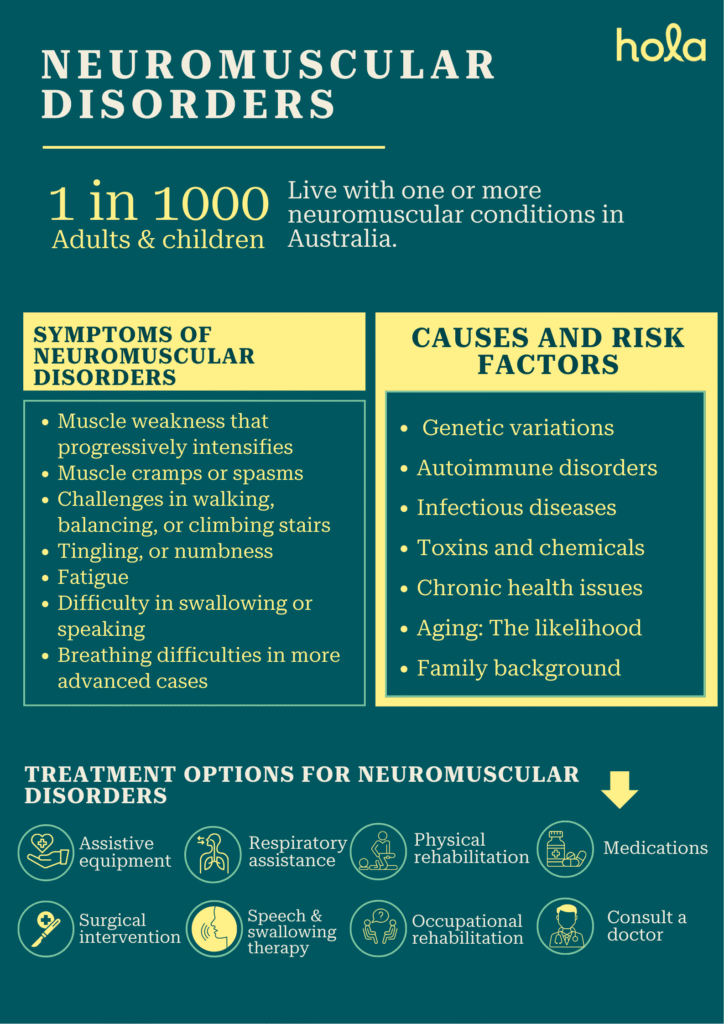What is the neuromuscular system and why does it matter?
Written by the editorial staff writer at Hola. Medically Reviewed by Dr Nelson Lau, MBBS FRACGP, GP & Digital Health Specialist.

Contents

Summary: The term neuromuscular refers to the connection between the nervous system and the muscles, which work together to support movement and vital body functions. Signals from the brain travel through nerves to muscles, enabling activities such as walking, breathing, and maintaining posture. Disruptions in this system can lead to neuromuscular disorders such as ALS or muscular dystrophy. Understanding the neuromuscular system highlights its vital role in daily life and the importance of its proper functioning.
Have you ever wondered how your body instinctively moves your hand when you decide to pick up a cup? Or how your legs automatically respond when you start to walk? Every voluntary movement – from lifting a cup to blinking – depends on rapid electrical signals traveling from your brain, down nerves, across the neuromuscular junction, and into muscle fibres, according to Dr Lau. This system allows your brain to communicate with your body, making every movement from blinking to running possible. In Australia, an estimated 41,408 individuals live with one or more neuromuscular conditions, representing a prevalence of approximately 1 in 1000 children and 1 in 1000 adults. These disorders may disrupt the nervous system’s ability to manage muscle movement, making it vital to understand the neuromuscular system. Let’s explore how this condition works and why it’s so important.What does 'Neuromuscular' mean?
Neuromuscular refers to the connection between the nervous system and the muscular system. It involves the transmission of electrical impulses from nerves that initiate muscle contractions. This interaction is essential for actions like breathing, walking, and even blinking.Why does it matter for health and daily movement?
The neuromuscular system is important for health and daily movement because it controls how your brain sends signals to your muscles. It enables you to walk, talk, breathe, and move smoothly and safely. When it is working well, your body reacts quickly and precisely. However, if it becomes impaired, it can lead to problems like muscle weakness, poor coordination, or even paralysis. A healthy neuromuscular system is crucial for maintaining independence, stability, and overall quality of life.What the neuromuscular system includes
The neuromuscular system is a complex network that links the brain, spinal cord, nerves, and muscles. It comprises the central nervous system (the brain and spinal cord), the peripheral nerves that stretch to muscles, neuromuscular junctions (where nerves interact with muscle fibres), and the muscles themselves. This system enables body movement by relaying signals from the brain to the muscles, managing both voluntary actions, such as walking and involuntary actions like reflexes. Additionally, it plays a crucial role in coordination, balance, and maintaining posture.Key parts of the neuromuscular system
The neuromuscular system consists of several key components that collaborate to regulate movement:- Brain: The central control unit that sends signals to initiate and manage muscle activity.
- Spinal cord: Serves as a communication pathway connecting the brain to the rest of the body.
- Peripheral nerves: Transport messages from the spinal cord to muscles located throughout the body.
- Neuromuscular junctions: Small connections where nerve signals trigger muscle contractions.
- Muscles: The tissues that contract in response to nerve impulses, allowing body movement.
Feeling sick and unsure why? Speak with a GP online in 15 minutes.
How the neuromuscular system works
The functioning of the neuromuscular system involves transmitting electrical signals from the brain via the spinal cord and peripheral nerves to the muscles. When the brain intends to move a body part, it sends a signal down the spinal cord. This signal progresses through motor neurons (nerve cells) to the neuromuscular junction, where it reaches the muscle fibre. Chemical messengers facilitate the transmission of this signal, causing the muscle to contract. This entire sequence occurs within milliseconds, enabling smooth and coordinated movement. Sensory nerves also relay feedback to the brain, assisting in the adjustment and refinement of actions.Role of neurotransmitters
Neurotransmitters are chemical messengers that assist in the transfer of signals between nerve cells and muscles within the neuromuscular system. At the neuromuscular junction, the primary neurotransmitter involved is acetylcholine. When a nerve signal arrives at the terminal end of a motor neuron, acetylcholine is discharged into the space between the nerve ending and the muscle. It subsequently attaches to receptors on the muscle surface, initiating muscle contraction. If neurotransmitter function is impaired, communication between nerves and muscles would be disrupted, resulting in weakness or movement difficulties.Common neuromuscular disorders
Neuromuscular disorders impact the nerves that govern voluntary muscles and the muscles themselves. Some of the most prevalent disorders include:- Amyotrophic lateral sclerosis (ALS): A progressive condition that damages motor neurons, resulting in muscle weakness and paralysis.
- Muscular dystrophy: A collection of genetic disorders that lead to muscle degeneration and weakness over time.
- Myasthenia gravis: An autoimmune disorder in which communication between nerves and muscles deteriorates, resulting in fatigue and weakness.
- Peripheral neuropathy: Damage to peripheral nerves, frequently causing numbness, tingling, and pain, often associated with diabetes.
Symptoms of neuromuscular disorders
The symptoms of neuromuscular disorders can differ based on the specific condition, but commonly involve:- Muscle weakness that progressively intensifies
- Muscle cramps or spasms
- Challenges in walking, balancing, or climbing stairs
- Tingling, numbness, or loss of sensation
- Fatigue, particularly following physical exertion
- Difficulty in swallowing or speaking
- Breathing difficulties in more advanced cases
Causes and risk factors
Neuromuscular disorders can arise from various factors, and sometimes the exact cause cannot be determined. Common contributors include:- Genetic variations: Many conditions, such as muscular dystrophy, are passed down through genes.
- Autoimmune disorders: Conditions like myasthenia gravis occur when the immune system mistakenly attacks the connections between nerves and muscles.
- Infectious diseases: Some viral or bacterial infections can harm nerves or muscles.
- Toxins and chemicals: Contact with heavy metals, pesticides, or pharmaceuticals can impair nerve function.
- Chronic health issues: Diabetes and renal diseases can result in nerve damage (neuropathy).
- Aging: The likelihood increases as one age, particularly with degenerative nerve diseases.
- Family background: A familial link to neuromuscular disorders raises the risk.
Treatment options for neuromuscular disorders
Management of neuromuscular disorders focuses on alleviating symptoms, delaying the progression of the illness, and enhancing quality of life. Although many of these ailments lack a cure, a blend of the following methods can be beneficial:- Medications: These may range from pain relievers, anti-inflammatory drugs, immune suppressants, to muscle relaxants, depending on the specific disorder. Newer targeted therapies (eg. Antisense oligonucleotides, gene replacement) are now PBS-listed for some conditions and can slow progression considerably)
- Physical rehabilitation: This helps preserve muscle strength, mobility, and joint flexibility.
- Occupational rehabilitation: Assists with daily activities and self-sufficiency through modified tools and techniques.
- Respiratory assistance: In progressive cases, breathing devices or ventilators may be necessary.
- Speech and swallowing therapy: Beneficial if muscles related to speaking or eating are affected.
- Assistive equipment: Devices such as braces, wheelchairs, or walkers can enhance mobility and safety.
- Surgical interventions: In certain situations, surgery may help rectify deformities or alleviate nerve pressure.

When to see a doctor
You should consult a online doctor if you experience ongoing muscle weakness, numbness, tingling, cramps, or coordination and balance difficulties. Additional warning signs include issues with speaking, swallowing, or breathing, especially if the symptoms progressively worsen over time. Timely medical assessment via telehealth appointments can facilitate the identification of neuromuscular disorders, initiate treatment earlier, and avert complications. If you have sudden breathing difficulties or rapid decline in swallowing, call 000 or attend the ED immediately.Conclusion:
In summary, the neuromuscular system is essential for all movement and muscle coordination. Understanding its mechanisms aids in diagnosing and managing related conditions, ultimately enhancing the well-being of those impacted.FAQs:
What are neuromuscular disorders?
Neuromuscular disorders refer to a group of conditions that impair the communication between the nerves and muscles. This disruption can cause muscle weakness, rigidity, cramping, or motor paralysis. Common examples include Muscular Dystrophy, ALS, Myasthenia Gravis, and Peripheral Neuropathy. These disorders can be genetic, autoimmune-related, or developed over time, and often require ongoing treatment and support.What are the early signs of a neuromuscular problem?
Early signs of a neuromuscular problem can vary but often include:- Muscle weakness
- Muscle cramps or stiffness
- Trouble walking or frequent falls
- Fatigue after minor activity
- Tingling in hands and feet
- Numbness
- Breathing problems in more serious cases
Can I get a referral to a neurologist online?
Yes, you can get a referral to a neurologist online through various telehealth platforms. Telehealth services like Hola Health connect you with licensed general practitioners (GPs) who can evaluate your symptoms and issue referrals if needed, all conducted online and usually delivered to your email within the same day.What treatments are available for neuromuscular conditions?
Treatments for neuromuscular conditions include:- Physical therapy
- Speech therapy
- Medications
- Occupational therapy
- Assistive devices like wheelchairs or braces
- Lifestyle support
- Surgery
Can I get a medical certificate for neuromuscular issues?
Yes, you can get a online Dr certificate for neuromuscular issues. A general practitioner (GP), neurologist, or relevant medical professional can evaluate your symptoms and issue a Dr certificate if your symptoms interfere with your ability to work, study, or manage daily tasks. You can get it through an in-person consultation or via telehealth. Always ensure the certificate includes clear details about your symptoms, functional impact, and recommended time off or accommodations.Are neuromuscular disorders permanent?
Some neuromuscular disorders are permanent, particularly the genetic ones like muscular dystrophy. Others, like Myasthenia Gravis, can be managed with appropriate medical intervention. Early care can help reduce symptoms and enhance daily functioning. Some acquired neuropathies such as Guillain-Barré can resolve with time.How do I book a neuromuscular-related consult online?
To book a neuromuscular-related consultation online, follow these steps:- Choose a telehealth platform
- Book a general practitioner (GP) appointment via video or phone.
- Discuss your symptoms—if required, the GP will give you a referral.
- Use the referral to book a specialist (neurologist) consultation.
What is neuromuscular pain?
Neuromuscular pain is the discomfort or distress caused by problems in the nerves, muscles, or their connection. It may feel like:- Tightness or soreness in the muscles
- Sharp or burning pain
- Muscle cramps or involuntary twitches
- Pain accompanied by muscle weakness
15 minutes, anytime, anywhere.
What we treat
- Cough
- Nausea & vomiting
- Fever
- Hayfever
- Fatigue
- Sore throat
- Acne
- Hair loss
- Gout
- Eczema
- Rosacea
- Sunburn
- UTI
- Erectile dysfunction
- Contraception
- Morning sickness
- Morning after pill
- Prostate health
- Anxiety
- Depression
- Stress
- Grief & loss
- Antidepressants
- Premature ejaculation
- Asthma
- Blood pressure
- Blood thinners
- Diabetes
- Cholesterol
- Migraines & headaches
- Allergies
- Body ache
- Heartburn & reflux
- Sleep disorder
- Pain relief
- Gastro
Related Articles
Disclaimer
This blog is for general informational purposes only and does not indicate that Hola Health provides all treatments or preventive measures mentioned. It is not intended to be a substitute for professional medical advice. Always seek the guidance of your doctor or other qualified health professional with any questions you may have regarding your health or a medical condition. For emergencies please immediately contact 000. Any medical topics discussed are intended to educate, not to imply availability through Hola Health.
 Facebook
Facebook  X
X  Copy Link
Copy Link



